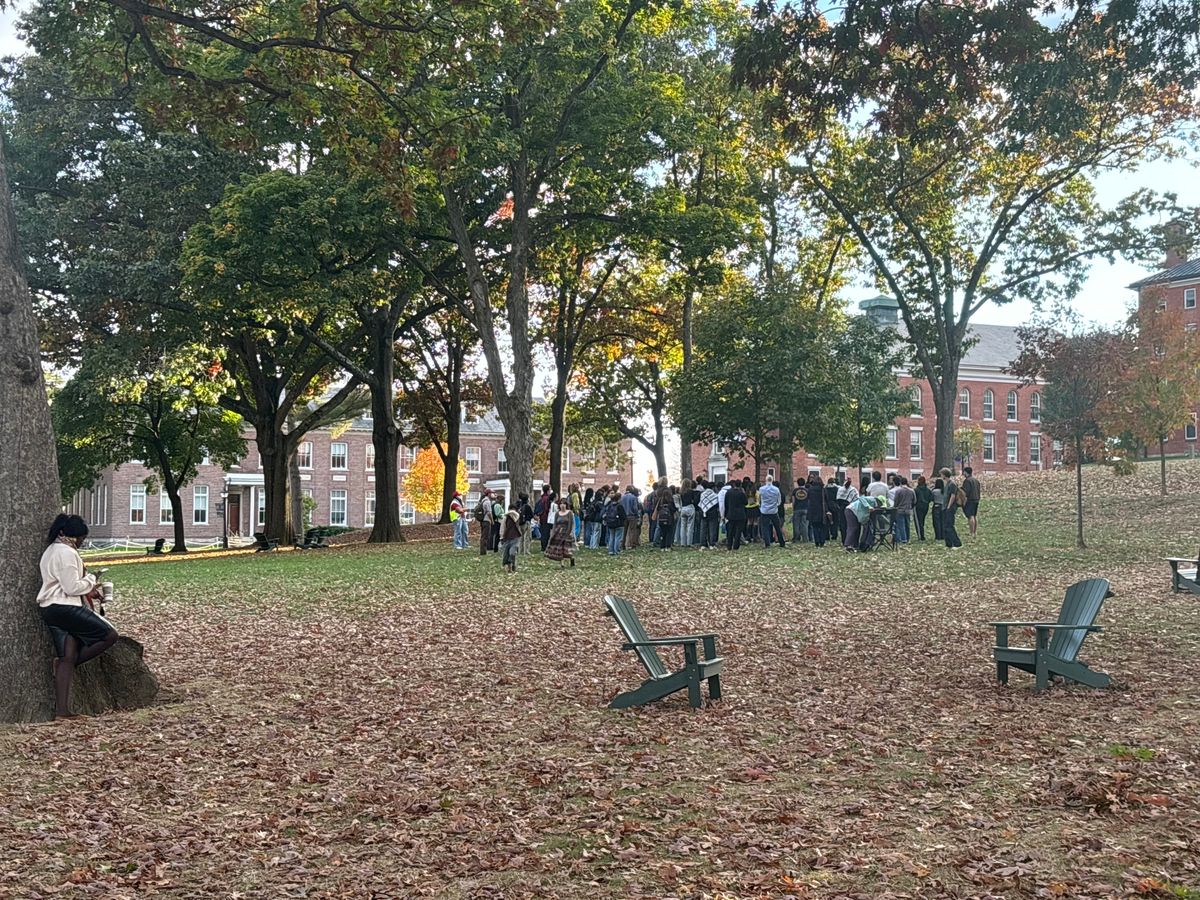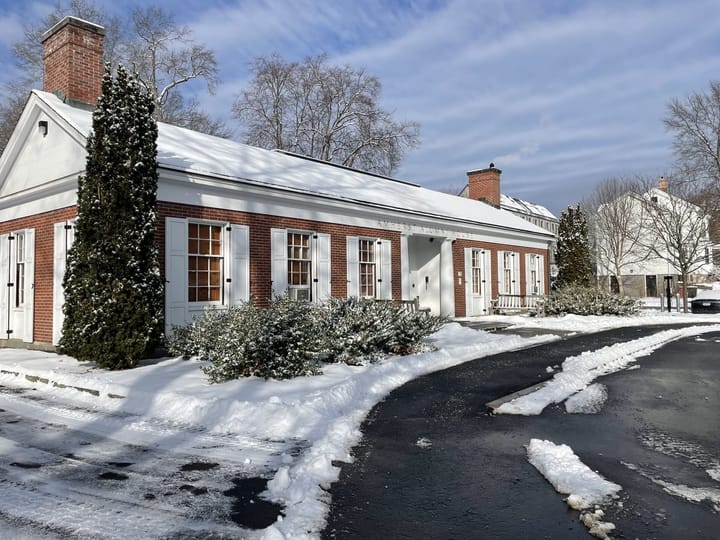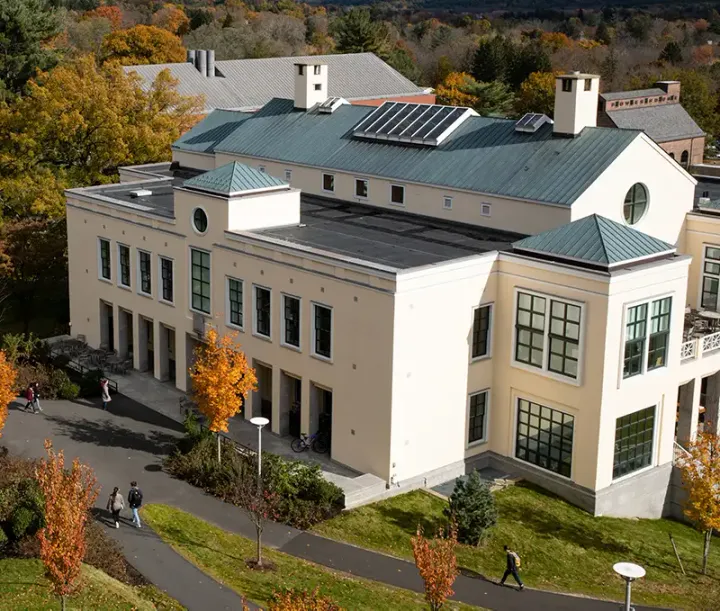On Oct. 7, SJP Marks One Year of “Zionist Escalation” and Palestinian Resistance
Amherst Students for Justice in Palestine rallied on the quad on Monday, marking the one-year anniversary of the Oct. 7 Hamas attacks in Southern Israel and an Israeli military campaign that has killed more than 40,000 in Gaza.

Amherst Students for Justice in Palestine (SJP) marked one year of “Zionist escalation” and “continued resistance against the Zionist project” at a rally Monday, the anniversary of the Oct. 7 Hamas attacks in Southern Israel that killed more than 1,100 and ignited an Israeli military campaign that has killed more than 40,000 Gazans.
Before a crowd on the first-year quad, speakers mourned lives lost in Gaza, the West Bank, and Lebanon, and encouraged students to build pressure for divestment following the Board of Trustees’ unanimous vote against it this summer. And in a rhetorical change from protests last year, some speakers from SJP seemed to celebrate the Oct. 7 attacks as a form of justified resistance.
“Today marks one year since Oct. 7, and one year since the United Front of Palestinian Liberation launched a counteroffensive against the Israeli occupying forces,” said the first of a number of SJP speakers who declined to identify themselves by name as they kicked off the rally.
“Oct. 7 will forever be remembered as a prison break, a day when the Palestinian people stood up to fight against settler colonialism,” said another.
On Oct. 7, Hamas militants killed more than 1,100 people, most of them civilians, abducted 252 others into Gaza, and committed acts of sexual violence against women and girls. The attack has been described by the United Nations as a violation of international law and a war crime. On the quad on Monday, there was no reference to the Israeli dead or those taken hostage, many of whom are still missing.
The UN has accused Israel of similar crimes — including intentional targeting of civilians, forcible transfer of populations, and acts of sexual violence — during its military campaign, which has killed more than 40,000 and displaced nearly 2 million.
Throughout the rally, SJP speakers emphasized the human toll of what they described as Israel’s genocidal campaign against Palestinians and linked their movement to the history of working-class movements in the U.S., “the global struggle for Black, Brown and Indigenous liberation,” and a “global Axis of Resistance” that includes Lebanon, Yemen, Syria, Iraq, and Iran.
They also located sources of hope amid the violence.
“Not once in the entire history of the Zionist project has the Palestinian nation been wholly defeated, not in 1948, 1956, 1967, 2005, or 2024,” said one speaker. “With dignity and honor, it defies the projects of colonialism and imperialism, undermines the logic of Zionism, and breathes new life into the revolutionary consciousness of oppressed nations across the globe.”
The rally on Monday, which was SJP’s first of the academic year, also saw the appearance of some of the chants and slogans that have caused controversy on other campuses, but had been absent from protests at Amherst for much of last year.
Last fall, organizers told The Student that they intentionally avoided the chant “from the river to the sea, Palestine will be free” in their protests. Some see the phrase as a call for ethnic cleansing of Jews in the land. On Monday, the protest began and ended with that chant, and a SJP speaker at one point described their groups’ struggle as a “global intifada,” another phrase that has caused controversy.
Not all speakers used those phrases or endorsed the events of Oct. 7.
“Today, we join to honor the innocent lives lost in Gaza, Palestine, Lebanon, and Yemen in the past year,” said Zakaria Shenwari ’25, who spoke on behalf of the Muslim Students Association. “In Islam, we hold those who have died unjustly as martyrs. Their martyrdom is a sign that the spirits of their loved ones left behind continue to live.”
One student, who declined to give his name, represented the African Caribbean Student Union and spoke of his experience meeting Palestinian refugees while studying abroad in Jordan.
“Many of my friends who I would go out to have coffee with, smoke some shisha with, still lived in the metal-walled shacks that their parents and grandparents were forced into in 1948,” he said. “Still more kicked out in ’67 are not even allowed to leave their refugee camps.”
He read statements by Israeli leaders about the need for “collective punishment” of the “entire nation” responsible for the Oct. 7 attacks. “Anyone who has studied the genocide in Rwanda knows this is exactly what you must be terrified of,” he said.
“I tell you, do not have blind confidence. Do not have hope,” he said in closing, with an eye to the upcoming election. “You have zero candidates on your ballot who support any form of peace for the Palestinian people. We don’t even have the energy for high hopes. We got to get goddamn provisional measures.”
The rally closed with a rendition of “Which Side Are You On?,” a union song from the 1930s, and a call from organizers to “continue to show up and help us mobilize around the cause of divestment.”
A few hours after the rally, members of the campus Jewish community, including Assistant Director of RSL and Campus Rabbi Shahar Colt, held a memorial service in Chapin Chapel. Attendees sang, prayed, and read poetry that mourned Israelis and Palestinians who have died on and since Oct. 7.
Multiple members of the community expressed their dismay over the timing of the rally.
“It was profoundly disrespectful for an inflammatory rally to take place on a day when Jews are mourning the murder of over 1,200 people and the kidnapping of over 250 hostages,” said Brett Donshik ’25 in a statement to The Student.
Some pro-Palestine groups at colleges like Williams and Brown chose not to host their anniversary vigils and rallies on Monday. SJP organizers at Amherst, who declined to give their names, stood by the rally’s date, reiterating their view that the Oct. 7 attacks were acts of resistance.
“In response to oppression from a colonizing power, oppressed people have the right to resist by any means necessary,” the organizers said. “The Palestinian resistance movement has exhausted every possible non-violent opportunity.”
They said the rally was planned to coincide with the “week of rage” events organized by the national arm of SJP and taking place at college chapters across the country. SJP organizers told The Student that they remain committed to divestment despite the Trustees’ unanimous vote over the summer.
“We understand the Trustees’ current position as an indication that we as supporters of justice for Palestinians have yet to disrupt Amherst College’s operations to the extent that will be necessary to make the college’s continued investment in the genocide untenable,” one organizer said during the rally.





Comments ()